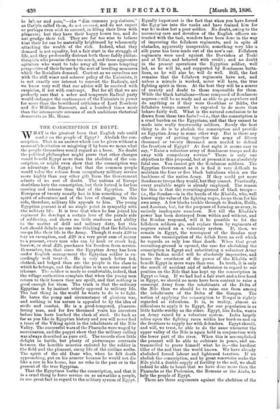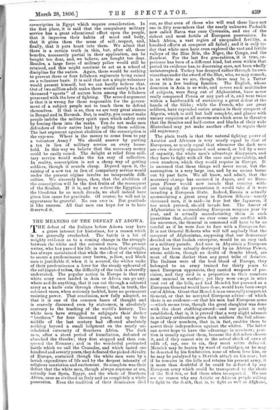THE CONSCRIPTION IN EGYPT.
WHAT is the greatest boon that English rule could confer on the people of Egypt ? Abolish the con- scription. That is an answer which can be given without a moment's hesitation or misgiving if by boon we mean what the people themselves would regard as a boon. No doubt the political philosopher might prove that other changes would benefit Egypt more than the abolition of the con- scription, or might even show that the conscription was an advantage to Egypt ; but that the common people -would value the release from compulsory military service more highly than any other gift from the Government admits of no sort of doubt. The nations of Europe -doubtless hate the conscription, but their hatred is far less 'moving and intense than that of the Egyptian. The European of twenty usually has in him something of the -spirit of adventure and of the love of change. On this side, therefore, military life appeals to him. The young Egyptian peasant is at no single point in sympathy with the military life. It is true that when he has joined his regiment he develops a certain love of the parade side 4.) f soldiering, and shows no little readiness and ability in the matter of drill and military duty, but this fact should delude no one into thinking that the fellaheen troops like their life in the Army. Though it costs £20 to buy an exemption, and £20 is a very great sum of money to a peasant, every man who can by hook or crook beg, -borrow, or steal £20, purchases his freedom from service. Remember, too, that since the Egyptian Army has been under English management the Egyptian soldier is ex- needingly well treated. He is very much better fed, -clothed, and lodged. than are the people in the class to -which he belongs, and the discipline is in no sense cruel or irksome. Thu soldier is made so comfortable, indeed, that the village authorities complain that when the young men return to their homes they are spoilt, and that nothing is good enough for them. The truth is that the ordinary Egyptian is by instinct utterly opposed to military life. The last thing in the world he wants to do is to fight. He hates the pomp and circumstance of glorious war, and nothing in his nature is appealed to by the idea of strife and combat. He is a good-tempered, pleasure. lovingman, and for five thousand years his ancestors before him have loathed the clash of steel. Go back as far as you like in Egyptian history and you will never find a trace of the Viking spirit in the inhabitants of the Nile Valley. The successful wars of the Pharaohs were waged by -mercenaries, and the papyri show that the military calling was always described as pure evil. The records show little -delight in battle, but plenty of picturesque Contrasts between the horrible miseries endured by the soldier in the field and the pleasant, smug life of the civilian scribe. The spirit of the old Dane who, when he felt death approaching, put on his armour because he would not die like a cow in his house, has no echo in the past or in the „present of the true Egyptian. That the Egyptians loathe the conscription, and that it is a cruel thing to force service on so nnwarlike a people, as one great fact in regard to the military system of Egypt. Equally important is the fact that when you have forced the Egyp:ian into the ranks and have trained him for war he makes but a poor soldier. No doubt, owing to the unceasing care and devotion of the English officers en- trusted with the task, wonders have been done in the way of improving the fellaheen regiments, and in spite of obstacles, apparently insuperable, something very like a silk purse has been made out of the sow's ear. Fella.heen regiments were used against the Dervishes at Toski and at Tokar, and behaved with credit ; and no doubt in the present operations the Egyptian soldier, well led, as he will be, and supported by Sudanese batta- lions, as he will also be, will do well. Still, the fact remains that the fellaheen regiments have not, and unless a miracle is worked, never will have, the true fighting spirit in them. At the best they will be a source of anxiety and doubt to those responsible for them. While the black battalions—those composed of Soudanese negroes—will be as ready and as able to go anywhere and do anything as if they were Goorkhas or Sikhs, the fellaheen troops cannot be expected to do more than behave fairly well. What is the natural conclusion to be drawn from these two facts ?—i e., that the conscription is a cruel burden on the Egyptians, and that they cannot be made into really trustworthy soldiers. Surely the best thing to do is to abolish the conscription and provide an Egyptian Army in some other way. But is there any other way of getting together the army of fifteen thousand or twenty thousand men needed to defend the frontiers of Egypt ? At first sight it seems easy to say, "Raise a volunteer army of Soudanese troops and do away with compulsory service." There is only one objection to this proposal, but at present it is an absolutely fatal one. You cannot get the Soudanese soldiers. The Egyptian Government as it is find it very difficult to maintain the four or five black battalions which are the backbone of the native Army. If they could get more Soudanese troops they would, but they cannot. Practically, every available negro is already employed. The reason for this is that the recruiting-ground of black troops- i.e., the Soudan—is in the hands of the Khalifa, who, well knowing the value of the fighting negro, keeps them for his own army. A few blacks trickle through to Suakin, Haifa, and Assouan, but, for the purposes of forming an army, in entirely inadequate numbers. Not till the Khalifa's power has been destroyed from within and without, and the Soudan reopened, will it be possible to let the fellaheen soldiers go, and replace them by regiments of negroes raised on a voluntary system. If, then, we remain in Egypt, the reconquest of the Soudan may mean the emancipation of the fellah from an evil which he regards as only less than death. When that great recruiting-ground is opened, the case for abolishing the conscription in Egypt and substituting a volunteer Army on the Indian model will be absolutely imperative, and hence the overthrow of the power of the Khalifa will benefit Egypt in more ways than one. In truth, it is only the result of accident and of indecision in regard to our position on the Nile that has kept up the conscription in Egypt so long. If we had had a fair start and a free hand in Egypt, we should no more have been content to raise a conscript Army from the inhabitants of the Delta of the Nile than we should be to raise one from among the inhabitants of the Delta of the Ganges. The notion of applying the conscription to Bengal is rightly regarded as ridiculous. It is, in reality, almost as ridiculous to apply it to Egypt, for one population is as little battle-worthy as the other. Egypt, like India, wants an Army raised by a volunteer system. India largely relies upon the fighting races within her borders and on the frontiers to supply her with defenders. Egypt should, and will, we trust, be able to do the same whenever the upper valley of the Nile is again held in conjunction with the lower part of the river. When this is accomplished the peasant will be able to cultivate in peace, and un- trammelled to prove himself what he is,—the hardiest tiller of the soil that the world knows. We have already abolished forced labour and lightened taxation. If we abolish the conscription, and by great reservoirs make the Nile yield a double supply of fertility to the soil, we shall indeed be able to boast that we have done more than the Pharaohs or the Ptolemies, the Romans or the Arabs, to help the people of Egypt.
There are three arguments against the abolition of the conscription in Egypt which require consideration. In the first place, it is said that the compulsory military service has a great educational effect upon the people, that it improves their habits of mind and body, that it gives them the sense of self -respect, and, finally, that it puts heart into them. We admit that there is a certain truth in this, but, after all, these benefits, necessarily partial in their application, can be bought too dear, and, we believe, are bought too dear. Besides, a large force of military police would still be retained, and this might continue to act as a school of discipline for the nation. Again, there would be nothing to prevent three or four fellahe,en regiments being raised on a volunteer basis. It is said that not a single volunteer would present himself, but we can hardly believe that. Out of two million adult males there would surely be a few thousand "sports" of nature born among the fellaheen possessed with the love of fighting. The second argument is that it is wrong for those responsible for the govern- ment of a subject people not to teach them to defend themselves. If that is so, then we are very great sinners in Bengal and in Burmah. But, in reality, you cannot make people imbibe the military spirit upon which safety rests by forcing them into the ranks. You do not make men defenders of their native land by calling them soldiers. The last argument against abolition of the conscription is the expense. Where is the money to come from to pay a volunteer Army ? We should answer by putting a tax in lieu of military service on every house- hold. In this way we believe that the necessary money could be easily raised. The delight at relief from mili- tary service would make the tax easy of collection. In reality, conscription is not a cheap way of getting soldiers, though it sounds cheap. Depend upon it, the raising of a new tax in lieu of compulsory service would under the present regime involve no insuperable diffi- culties. We sincerely hope, then, that the abolition of the conscription will be the first fruits of the reconquest of the Soudan. If it is, and we relieve the Egyptian of the blood-tax he so much dreads, we shall indeed have given him cause for gratitude. Of course, he will not in appearance be grateful. No one ever is. But gratitude is like success. All that men can hope for is to have deserved it.







































 Previous page
Previous page